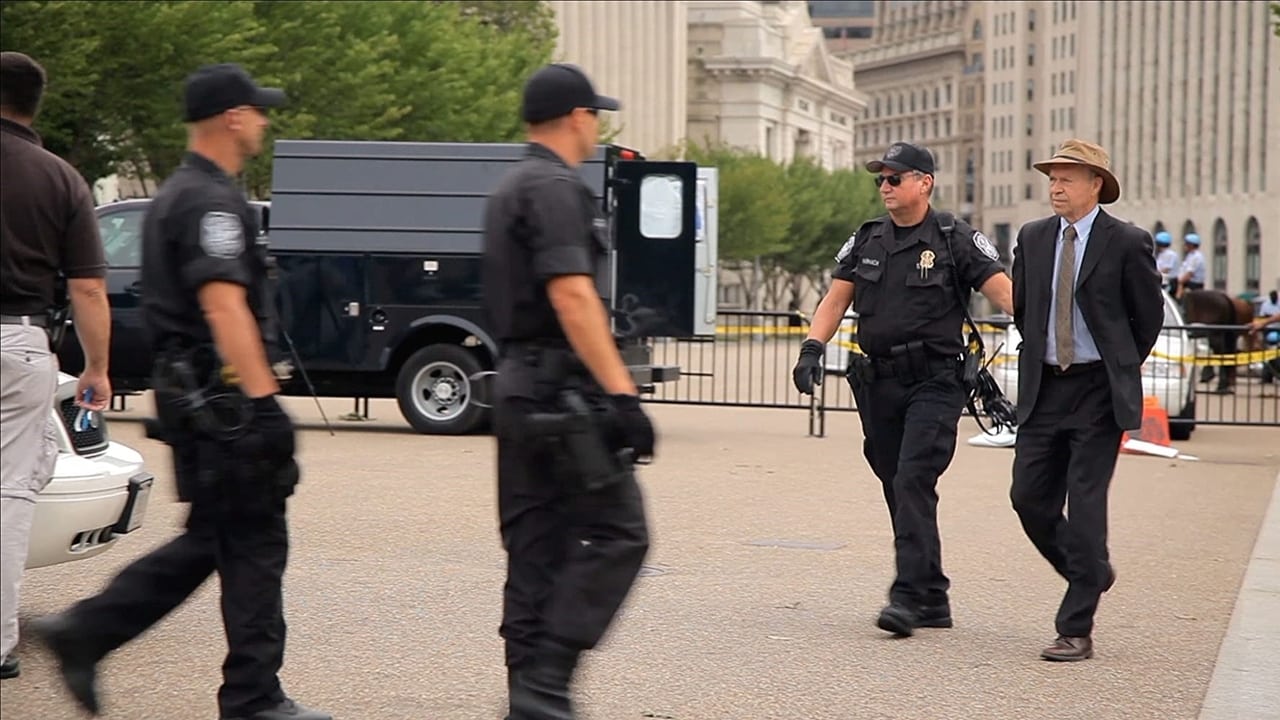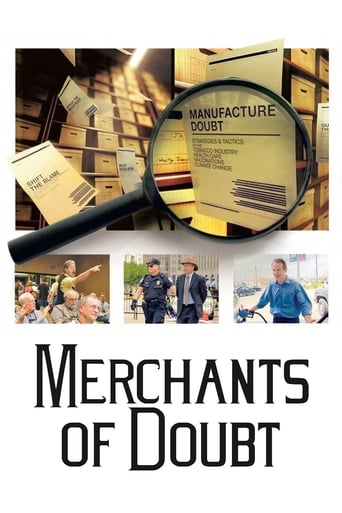

People are voting emotionally.
... View MoreFrom my favorite movies..
... View MoreThere is just so much movie here. For some it may be too much. But in the same secretly sarcastic way most telemarketers say the phrase, the title of this one is particularly apt.
... View MoreAfter playing with our expectations, this turns out to be a very different sort of film.
... View MoreKenner tells us that big oil is using the same tactics – and often the same personnel – as big tobacco: set up any number of supposedly independent thinktanks, get plausible professionals on the (mouthwatering) payroll, and just sow the seeds of doubt. You undermine conviction, filibuster government action, fog public opinion, get brazen blowhards to shout loudly on Fox News. And the people best at this are the ageing, neocon attack dogs, veterans of the tobacco wars, who in the evening of their lives find a thrilling new purpose in climate change doubt-production.
... View MoreA documentary like Merchants of Doubt should be mandatory in schools. Just so that the kids can open their eyes about the influence of the media on the brainwashed Americans, lobbyists of all kind and maleficent greedy people. I already did not have a great view about certain humans before watching this documentary and at the end it certainly did not improve. The power of those greedy bastards from the petrol, tobacco, and guns lobbies is just sickening to watch. The amount of conservative people that will take anything for granted if it comes out of their mouths is just frightening. Republican rednecks, I just can't stand them. Most of them are so stupid you wonder how it is possible to be that ignorant. Anyways, this documentary is really a must see if you are interested in the future of our planet. I already know the vast majority of rednecks won't change their opinion because they are just not smart enough to see the truth or they are just to stubborn to admit they were wrong. Bottom line, I hate a lot of humans on this planet.
... View MoreThe doc is enlightening, and timely. I worked in the tobacco litigation and this film gets it spot on. In the face of near universal consensus, tobacco companies hired marketing firms and paid scientists to poke holes in prevailing well established theory, attempting to cast doubt where anything less than 100% certainty exists, which in science, it essentially always does.Now the climate change deniers come out, in the face of 97% worldwide consensus, peddling the same nonsense. The doubters don't contest the data, which is indisputable. They instead attack the motives of 97% of the climatologists in the world. And their intended audience buys it hook line and sinker yet again. Reasonable doubt is essential to science, and in that meritocracy, the best explanation wins. Here, decades of data have made the situation clear. Yet, climate denier laymen, for some reason, choose to believe the 3% of scientists who are largely funded by the interests most likely to suffer financial harm should alternative energy be explored in full. You can't fix stupid.
... View MoreFirst, a note that my February 2, 2015 'pre-review' of the movie has completely disappeared. No matter, I have a screencapture of it for posterity, and it was a speculation on what I expected to see in the movie from having read the book it was based on.So, having now seen the movie, it's my opinion the movie succeeded in its intended goal, if that was to professionally and entertainingly present a story about the corruption of skeptic climate scientists. This was not a dull movie in the least, it even contained some genuinely moments of humor that were intended to be humorous. No doubt the few others in the theater with me would agree on that impression, and if they only had a passing familiarity with the enviro-activist side of the issue, they would also say the movie contained devastating material.But I am fully aware of both sides of the movie, and could easily do a start/stop presentation of it on my own, playing it for a short time and then stopping it to point out its egregious misdirections. Take for example the bit where Michael Shermer claims he pointed to a graph to make his pronouncement about global warming, and then said his debate opponent used the same graph to come to a different conclusion. And that was all that were were allowed to see, not a full context view of what really happened. Skeptic debaters do use their opponents' graphs, to show how a false conclusion is derived from lopping off inconvenient sections of the graph.I could go on at length, but in short, one of the people appearing in the movie essentially gave a misrepresentation of when and how he discovered the 'corruption of skeptic climate scientists', the claim about multiple fake names in the Oregon Petition Project is misdirection, Shermer's question of "where's the evidence?" from skeptic scientists is misleading, details are left out of James Hansen's predictions are missing, assertions about the 'attacks on scientists' such as Michael Mann are misleading, on and on. If I or anyone else was to do a start/stop routine with the movie, it could easily double the length of the whole presentation.By all means, I openly encourage people to view the movie, but they should also seek out video presentations of the skeptic side of the issue and compare them side-by-side and come to their conclusions about which side makes a better case. But they should also take into consideration just how hard the people within this movie try to prompt the public to ignore skeptics via an overall character assassination effort that has yet to provide a scintilla of evidence to prove skeptic climate scientists are paid and instructed to lie to the public and to fabricate false climate assessment reports.In going through that exercise, I believe objective people will see this movie as a slick presentation which ultimately fails to tell the whole truth about the politics surrounding the global warming issue. Much like other efforts having the same goal, misdirection only undermines any given agenda, and when people do catch up with what is going on in this case, as one of the people ironically suggested in the movie, it could torpedo the entire so-called global warming crisis.
... View More